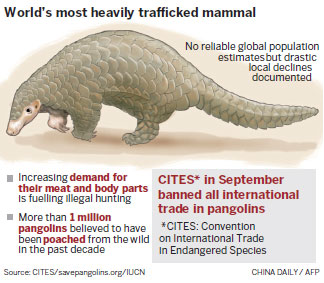Pangolin center shows scale of the wildlife challenge
Pangolin Mi Bo has seen better days. He arrived at a rescue center in Vietnam missing a paw after it was cut off in a snare trap.
The rest of his body is marked by red lacerations, and he will probably never regain enough strength to return to the wild.
But he is among the lucky ones.
Rescued from poachers, Mi Bo and dozens of other pangolins are being nursed back to health by Vietnamese conservationists fighting to save the scale-covered creatures from extinction.
The reclusive pangolin has become the most trafficked mammal on earth due to soaring demand in Asia for their scales for traditional medicine and their flesh, considered a delicacy.
An estimated one million of the animals, often called "scaly anteaters", have been plucked from Asian and African forests over the past decade, shunting them onto the list of species at the highest risk of extinction.
About the size of a small dog, pangolins are defenseless in the wild, curling up into a ball when they are scared, allowing poachers to easily scoop them up.
Their dire predicament will be on the agenda at a major wildlife conference opening in Hanoi on Thursday, which will be attended by Britain's Prince William - a champion of better-known endangered species such as elephants and rhinos.
Although the pangolin trade is illegal in Vietnam and they are in the government's "red book" of endangered species, law enforcement remains weak.
Authorities have even been caught selling the endangered animals after seizing them from poachers, according to media reports.
Their meat is considered a delicacy and customers often drink their blood or use their scales in special elixirs as a cure for anything from impotence to menstrual cramps to asthma and even cancer.
However, there is no scientific evidence for any of the supposed medical benefits.
Scientists don't know how many pangolins are left in the wild, but experts say the size of illegal pangolin hauls in Asia has grown in recent years - in 2015, two tons of dead pangolins from Nigeria were found in a single seizure in Hong Kong.
Nguyen Van Thai, the director of Save Vietnam's Wildlife, said he has watched in dismay as pangolin numbers have fallen through the floor.
"It's really sad, it's like over 20 years later and there are no pangolins in this area. We need to take action," he said.

























